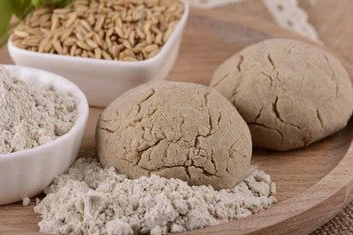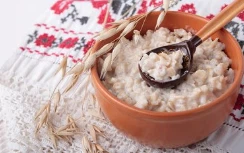Gluten is a protein found in grains like wheat, barley, and rye. For individuals with celiac disease or gluten sensitivity, consuming gluten can trigger a negative immune response that damages the small intestine. This can lead to symptoms like abdominal pain, diarrhea, nausea, and fatigue. As a result, following a strict gluten-free diet is essential for managing these conditions.

Oats are inherently gluten-free, but they are often contaminated with gluten during growing and processing. Oat powder is a gluten-free whole grain flour made by grinding oats into a fine powder. But there is some debate around whether oat powder is safe for people who require a gluten-free diet. This article will examine the controversy surrounding oats and gluten, discuss research on oats and gluten sensitivity, and provide considerations for choosing gluten-free oat powder.
Understanding Gluten and Oats
Gluten is a general name for the storage proteins found in wheat, barley, rye and other closely-related cereal grains. The two main proteins that make up gluten are gliadin and glutenin. When flour and water are combined, these proteins form an elastic network that gives bread and other baked goods their chewy texture. For individuals with celiac disease or non-celiac gluten sensitivity, the immune system reacts to these gluten proteins, triggering intestinal damage and symptoms (1).
Oats are naturally gluten-free, meaning the oat grains themselves do not contain gluten proteins. However, most commercially grown oats are often cross-contaminated with wheat, rye or barley during growing, harvesting, transport or processing. This introduces gluten into otherwise gluten-free oat products (2).
Controversy Surrounding Oats and Gluten
When it comes to whether or not oats can be safely consumed on a gluten-free diet, there is a lot of debate. Oats contain a protein called avenin, which is similar in structure to the gliadin found in gluten grains and is the source of the controversy.
In people with celiac disease, some researchers think that avenin can cause intestinal damage and an immune response similar to gliadin. In any case, different examinations have found that most of individuals with celiac sickness can endure moderate measures of uncontaminated Fine Oat Powder without encountering unfavorable impacts (3).

Furthermore, it's felt that any aggravation from oats found in these examinations might result from cross-pollution as opposed to the actual oats. Severe without gluten oat items that are uncontaminated are possible safe for most people requiring a sans gluten diet (4).
Gluten-Free Certifications and Oat Products
To help recognize really without gluten oat items, there are associations that give gluten-free accreditation and marking. This testing guarantees that items are uncontaminated and alright for sans gluten abstains from food.
The Gluten-Free Certification Organization (GFCO) is a distinct organization that certifies gluten-free products. GFCO accreditation expects that items contain under 10 sections for each million (ppm) of gluten. Additionally, GFCO provides purity protocol oats with an additional certification, indicating that additional precautions are taken to prevent cross-contamination.
The Crossed Grain Symbol from the Canadian Celiac Association and Certified Gluten-Free from the Gluten Intolerance Group (GIG) are two additional certifications to look for. Understanding names and just buying Fine Oat Powder and other oat items with one of these logos can give affirmation that the thing is sans gluten.
Research Studies on Oats and Gluten Sensitivity
Numerous studies have examined the effects of oats on individuals with celiac disease and gluten sensitivity.
One randomized controlled concentrate on distributed in the American Diary of Clinical Nourishment took a gander at the effect of uncontaminated oat utilization in grown-ups with celiac sickness following a gluten-free diet. Consuming moderate amounts of oats for a period of 12 weeks did not result in intestinal inflammation or symptoms, according to the study.

Another study had similar findings in kids with celiac disease. After including oats in their diet for 12 months, most were able to tolerate oats without any clinical or serological signs of contamination (7).
While a small subset of people with celiac infection may not endure oats, most examinations reason that uncontaminated oats are ok for the greater part. However, individuals should introduce oats carefully and be monitored by a healthcare professional in case any symptoms develop.
Considerations for Choosing Gluten-Free Oat Powder
When choosing an oat powder, carefully read the label and look for a logo that certifies that it is gluten-free. Additionally, organic oat powder should be considered because organic growing and harvesting procedures aid in reducing contamination. Purity protocol oats also provide added assurance of gluten-free purity.
Settle on trustworthy brands and makers that work in sans gluten items and have straightforward naming. Keep away from oat powder items that contain wheat, grain, rye or malt extracts, or imparted hardware and offices to gluten-containing grains. Cross-tainting is as yet a gamble for certain items.
Store oat powder in a sealed shut compartment and check the termination date, as oats can be dependent upon defilement over the long haul. Just buy unopened compartments from the rack to guarantee no tainting from scoops or contact with other gluten-containing items. Lastly, before including oats or oat powder in your gluten-free diet, consult your doctor.
Conclusion
While oats are normally sans gluten, the discussion go on around whether oat-based items are protected choices for those with celiac infection and gluten awareness. However, the majority of people, according to the most recent research, can tolerate oat powder and pure, uncontaminated oats. Choosing certified gluten-free oat powder, verifying purity protocols, and purchasing from trusted brands can provide peace of mind that products are safe for gluten-free diets. In order to gradually introduce oats and keep an eye out for any potential symptoms, people should collaborate with knowledgeable healthcare providers. With legitimate insurance, oat powder can be a nutritious expansion to a gluten-free diet.
Shaanxi Guanjie Technology Co., Ltd, a manufacturing enterprise established in 2003, specializes in the vegetable extract industry. With two independent production lines for freeze-dried and spray-dried products, our company ensures high-quality output. We have obtained prestigious certifications such as ISO9000, ISO22000, HALAL, KOSHER, and HACCP, demonstrating our commitment to excellence. From the initial stage of raw material planting and collection to the precise processing and production procedures, we strictly adhere to the requirements of GMP production enterprises. This meticulous approach guarantees the safety and quality of our products. As industry experts, our Fine Oat Powder Bulk has garnered exceptional customer feedback. If you are interested in this product or would like to explore other related options, we welcome you to contact us at info@gybiotech.com or visit our homepage.
References:
1. S. Guandalini, A. Assiri, and Celiac illness: a survey. Pediatrics, 168(3), 272–278, JAMA, 2003.
2. Pulido, O. M., Gillespie, Z., Zarkadas, M., Dubin, K., Vavasour, E., Rashid, M., Switzer, C., and Godefroy, S. B. (2009). Presentation of oats in the eating routine of people with celiac sickness: an orderly survey. Propels in food and nourishment research, 57, 235-285.
3. Haboubi NY, Taylor S, Jones S. Coeliac infection and oats: an orderly survey. Postgraduate clinical diary. 2006 Sep 1;82(972):672-8. doi: 10.1136/pgmj.2006.045443. PMID: 16954490; PMCID: PMC2563553.
4. Comino, I., Genuine, A., de Lorenzo, L., Cornell, H., López-Casado, M. Á., Barro, F., Lorite, P., Torres, M. I., Cebolla, Á., and Sousa, C. (2011). Variety in oat likely immunogenicity: basis for selecting oat varieties that do not cause coeliac disease toxin. Gut, 60(7), 915–922.
5. Organization for Gluten-Free Certification. n.d.). Certification as Gluten-Free
6. M. Seymour, S. K. Lewis, L. Urcuyo, and C. Catassi Impact of Oat Source (Debased versus Uncontaminated) on Resistance and Gastrointestinal Hindrance Capability in Grown-ups With Celiac Sickness: A Randomized Controlled Preliminary. JAMA network open, 2(11), e1915325.
7. Gatti, S., Caporelli, N., Galeazzi, T., Francavilla, R., Barbato, M., Roggero, P., Malandrino, N., Montagna, A., Iacono, G., Gesuita, R., Catassi, C., and Lionetti, E. (2018). Oats in the eating regimen of youngsters with celiac illness: Initial findings from a multicenter, double-blind, randomized, and placebo-controlled Italian study. 10(10): 1365, Nutrients.






